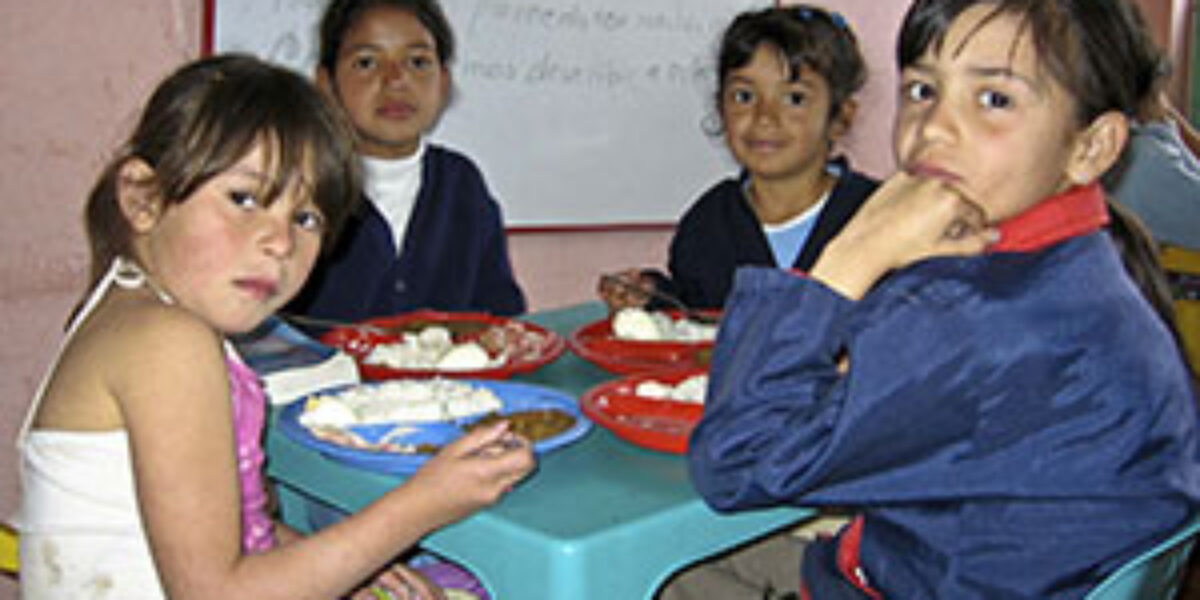BOGOTÁ, Colombia (Mennonite Mission Network) — The tantalizing scent of rice and chicken wafted around children with furrowed brows trying to decipher their homework. When the volunteer cooks announced that lunch was ready, 60 children scrambled to find places at the table. The balanced meal awaiting them was insurance against the distraction of hunger when they resumed afternoon classes.
This scene is played out in many locations throughout Colombia in comedores (dining rooms), ministries of Iglesia Cristiana Menonita de Colombia (Colombia Mennonite Church). The meals provide nourishment for the bodies and souls of the youngest members of families displaced by violence in Colombia.
María Inés, director of Los Pinos Comedor and member of Teusaquillo Mennonite Church, believes that in these safe spaces children can express their emotions and strengthen their self-esteem.
"Our vision of Christian service is an ample vision where all are included, where children hold an important place. Marginalization and violence generate serious doubts in a child’s mind over his or her worth as a person. As we minister to the children that God has entrusted us with, we are building a spirituality of peace," Inés said.
Members of the Colombia Mennonite Church have a costly commitment to peace in this conflict-torn country. Their conviction that lasting peace cannot be achieved when people are hungry led the church to add feeding programs to their other ministries, such as, evangelism, leadership training, the Justapaz peace and justice center, a development agency, a school, a home for the elderly and a retreat center.
In 2007, the Colombia Mennonite Church’s ministries to children received the equivalent of a high-protein supplement through a generous gift from Ellen Rosser.
The seeds of this gift were planted twenty years ago during a 30-day fast when Rosser began thinking about the plight of street children in Brazil. She decided she must do something to touch the lives of children at risk in South America.
A long gestation period came to fruition while Rosser was in Sarasota, Fla., with her mother in 2005. She was involved with the Ashton Mennonite Church when she received a settlement from a class-action lawsuit. Rosser talked with Ashton’s pastor, Marlin Birkey, about realizing her long-held vision. Birkey directed her to Mennonite Mission Network.
When Rosser contacted Linda Shelly, director for Latin America, she had detailed plans for an ecologically-friendly home for street children in Brazil where she hoped to volunteer.
Through a series of conversations, Shelly explained Mission Network’s policy of partnering with national churches to support them in achieving their own culturally appropriate and sustainable mission visions. Shelly proposed that Rosser’s donation be given to strengthen the already intiatied children’s programs of the Colombia Mennonite Church.
Moving beyond her own dream, Rosser accepted the proposal. Most of her $20,000 donation became a grant to the Colombia Mennonite Church for 10 projects that touch the lives of at-risk children.
According to 2007 United Nations statistics, 12 percent of Colombian children under age 5 suffer from growth stunting. That statistic is nearly double among the displaced population. These children also suffer educationally and emotionally.
The outreach ministries of the Ibagué congregation were among those able to increase their scope through Rosser’s gift.
Members had been working in Modelia, a neighborhood composed entirely of displaced people, for six years. In 2005, they opened a comedor that provided lunch for 20 children once a week. A year later, they were able to feed 50 children twice a week. In 2007, with the boost of Rosser’s gift, they welcomed 70 children three times a week.
Ibagué members began Sunday morning services in Modelia for the children who participated in their lunch program. Many parents began to attend, forming the nucleus of a daughter church, Semillas de Esperanza (Seeds of Hope).
A licensed teacher began a preschool program in Modelia that prepares children to enter the public school system and also gives older students help with their homework. Last Christmas, each child received basic school supplies. In cases of extreme need, the fund helped pay school registration fees.
The program has offered workshops dealing with peace-building, ethics, values, gender, nonviolence, self-esteem and trauma-healing.
Luz Amanda Valencia – psychologist, coordinator of the Semillas de Esperenza projects and member of the pastoral team – spoke of the profound changes she has witnessed in the lives of the children, many of whom arrived with behavioral problems.
"Many of them come from homes where there is domestic violence. Several children’s parents are in jail. Over time, with all the teaching, listening and love the children receive at Seeds of Hope, we’ve seen a lot of positive transformation," Valencia said.
Rosser’s gift encouraged similar change for good in the ministries of each congregation that was awarded part of the grant and several new congregations have grown out of these ministries. Each location has adapted its programs to fit the unique needs of the population it serves.
Shalom Wiebe, from British Columbia, serves as a support worker for people under threat with Mennonite Central Committee in Colombia.







